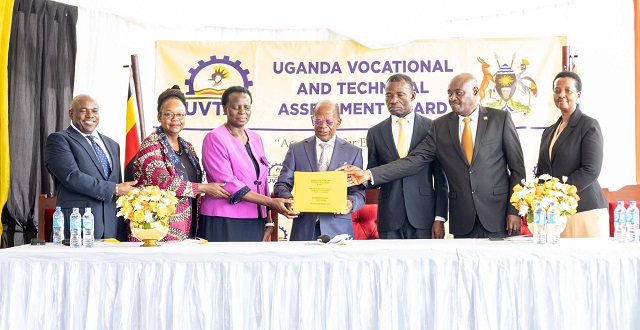
Kampala,Uganda | Patricia Akankwatsa | The Uganda Vocational and Technical Assessment Board (UVTAB) today released the highly anticipated results of the November/December 2024 Technical and Vocational Assessments, marking a pivotal moment in Uganda’s skills development landscape. These assessments, the last under the former Uganda Business and Technical Examinations Board (UBTEB) before the full commencement of the TVET Act 2025, signify an important transition towards a more unified and employer-led vocational training system.
Onesmus Oyesigye, the Executive Secretary of UVTAB, presented the results, highlighting the extensive reach of the assessments which were conducted from November 19 to December 18, 2024, across 573 assessment centers nationwide. A total of 31,890 candidates registered for the series, comprising 12,111 female and 19,779 male participants. The majority, 98% (31,387 candidates), pursued certificate programs, while 2% (503 candidates) were in diploma programs.
Overall, candidate turnout was impressive, with 92% (29,378) of registered individuals participating.
The results paint a largely positive picture, with 91% (26,680) of candidates successfully acquiring full competencies, making them ready for employment or further training. Specific program breakdowns revealed strong performance across the board.
In National Certificate Assessments, 93% (18,680 candidates) achieved full competencies.
While most programs boasted over 80% completion rates, a notable challenge was observed in the National Certificate in Electronics Technology, which had a lower pass rate of 60%, partly attributed to difficulties in applied mathematics and entrepreneurship.
In Business and Other Humanities Programs, an 80% competence acquisition rate was recorded, though this represented a slight 1% decline from 2023. Areas needing improvement were identified in Certificate in Software Engineering (Computational Mathematics and Web programming), Certificate in Procurement and Logistics Management (Bookkeeping), and Certificate in Secretarial and Office Management (Shorthand, Economics, and Bookkeeping).
Encouragingly, Physical and Biological Sciences Programs saw a significant improvement in Distinction acquisition, rising to 40% compared to 29.1% in December 2023.
Professor Dorothy Okello, the Chairperson of the UVTAB Board, expressed profound gratitude for the enactment of the Technical, Vocational, Education and Training (TVET) Act 2025, emphasizing its crucial role in developing a competent national workforce.
“The TVET Act 2025 was passed at a time when the country needs a competent workforce,” she stated.
Professor Okello also highlighted the Board’s commitment to upholding quality and standards in TVET assessment, noting that the Act establishes a robust regulatory framework, provides a pathway for recognizing both formal and informally acquired skills, and mandates strong collaboration between training providers and industry stakeholders.
This collaborative approach, she stated, is vital for aligning curricula with market demands and bridging the gap between theory and practice through initiatives like apprenticeships and on-the- job training.
Allen C. Kagina, the Chairperson of the Technical, Vocational, Education and Training (TVET) Council, welcomed the results as a testament to collaborative efforts in the TVET system. She emphasized the Council’s role in providing oversight and the future registration and regulation of artisans and technicians to enhance quality in the industry.
Dr. Kedrace Turyagyenda, the Permanent Secretary of the Ministry of Education and Sports, congratulated UVTAB on this milestone and reaffirmed the Ministry’s commitment to enhancing trainer quality and strengthening training infrastructure.
Speaking on behalf of the First Lady and Minister of Education and Sports, Hon. Janet K. Museveni, the state minister for Higher Education, John Chrysostom Muyingo, expressed appreciation for the parents and particularly the significant number of female candidates choosing TVET.
He lauded the assenting of the TVET Act 2025 and the inauguration of the first UVTAB Board, emphasizing continuous collaboration with stakeholders, particularly the private sector, to ensure relevant and high-quality training. Minister Muyingo reiterated the government’s plan to scale up TVET training through various centers and acknowledged the need to expedite the TVET Qualifications Framework for smooth career progression.
He also extended gratitude to the Government of Belgium through ENABEL for their unwavering support.
Key achievements outlined by Oyesigye include the successful conduct of assessments without any paper leakages, sustained efforts to clear the backlog from the former Directorate of Industrial Training (DIT), and the maintenance of ISO Certification, ensuring adherence to quality standards.
The completion and upcoming commissioning of a new Assessment Centre building were also highlighted as a significant milestone, alongside continued collaboration with partners like ENABEL, which has supported the retooling of subject specialists and assessors. The operationalization of the TVET Act 2025 and ongoing support for 173 special needs candidates further underscore the board's commitment to inclusive and effective vocational training.
Despite these successes, challenges persist. Oyesigye noted inadequate assessment materials, equipment, and manpower, particularly for practical assessments. The delay in licensing and registration for some institutions under new policy shifts is also hindering candidate presentation.
Crucially, the absence of a comprehensive TVET Qualifications Framework makes it difficult to align and classify informally acquired skills.
To address these, UVTAB recommended equipping training institutions, expediting institutional licensing by the TVET Council, fast-tracking the development of the TVET Qualifications Framework, and establishing mechanisms for continuous professional development for instructors.
 The Independent Uganda: You get the Truth we Pay the Price
The Independent Uganda: You get the Truth we Pay the Price





